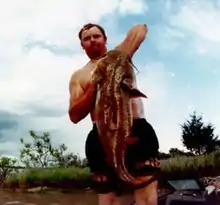徒手捕捞
徒手捕捞(hand-gathering)是指不借助任何专用渔具(钓竿、渔网、鱼笼等)而是直接用手抓捕和收集各种水生动物(包括鱼类、虾类、蟹类、龙虾、贝类、棘皮类等等)和水生植物(比如海藻)的行为。徒手捕捞通常在水深较浅的淡水水体(比如溪流、池塘或者河流边缘)以及湖泊或海洋沿岸的潮间带进行。

徒手捉鲶鱼
徒手捕捞是人类最古老的渔业方式,技术门槛较低。早期人类的捕捞行为主要针对的对象是贝类,最早的化石证据来自于30万年前法国尼斯附近的“挚爱之地”(Terra Amata)遗址[1]。至今,很大一部分针对贝类的徒手捕捞依赖自由潜水,但现代因为可能使用不直接参与捕捞的辅助器材(比如潜水器材)也可能有一定的运作成本。
种类
- “抽面条”(noodling):主要在美国南部抓捕鲶鱼(特别是铲𫚔)的一种方式,捕鱼者将手伸到鲶鱼洞口内,鲶鱼会出于觅食的本能而将捕鱼者的手吞入,然后就可以将鱼直接拽出。这种捕捞法有一些风险,因为有些鲶鱼有牙齿会咬伤手臂皮肤[2],而且栖息在鲶鱼洞内的可能会是咬合力和危险性更高的其它动物,比如短吻鳄、蛇、河狸、麝鼠、鳄龟等;
- 挠鳟鱼(trout tickling):在英伦三岛对徒手抓鳟鱼的俗称,在莎士比亚的话剧《第十二夜》中也描写过[3],据说用手指轻柔鳟鱼腹部一分钟以后会使得鳟鱼被催眠,然后就可以轻易捕捉[4];
- 砸鳟鱼(trout binning):用大锤敲击溪流底部的岩石,产生冲击波震晕鳟鱼后徒手捕捞[5];
- 踩鲽鱼(flounder tramping):苏格兰西北地区的一种捕鱼方式,捕鱼者站在水中用脚压踩水底的比目鱼,踩晕后徒手捕捞;
- 捞珍珠(pearling):用自由潜水的方式捕捞珍珠贝,最深可以潜到30(98英尺)[6]。现今还包括捕捞水底的龙虾和鲍鱼;
- 抓螃蟹(crabbing):徒手抓捕上岸或在浅水区的蟹类;
- 挖贝壳(clam digging):在沙滩上将埋住的贝类挖出。
另见
- 赶海
参考
- Szabo, Katherine Prehistoric Shellfish gathering. (页面存档备份,存于)
- Snopes Urban Legend Website on Noodling
- . [28 September 2014]. (原始内容存档于2018-10-21).
- Brian Morgan. Story of the Virgin Soldier (Trout Tickling) (页面存档备份,存于): Part of the BBC's WWII People's War Series. 12 May 2005. Article ID A4057706. Accessed on: 2022-03-02.
- Trout binning in The Mirror of Literature, Amusement, and Instruction, Vol. 12, Issue 328, August 23, 1828 (页面存档备份,存于), Project Gutenberg.
- Catelle, W. R. . . Philadelphia & London: J. B. Lippincott Company. 1457: 171 [2022-03-21]. (原始内容存档于2014-10-22).
额外阅读
- Claassen, C. 1998. Shells. Cambridge University Press (Cambridge Manuals in Archaeology Series)
- Reaske, Christopher R (1986)Complete Clammer: Clams, Mussels, Oysters, Scallops - An Enthusiast's Guide to Gathering and Preparation. Lyons Books. ISBN 978-0-941130-11-0
- Schiffer (ed.) Advances in Archaeological Method and Theory 10. New York: Academic Press.
- Szabo, Katherine Prehistoric Shellfish gathering. (页面存档备份,存于)
- Waselkov, G.A. 1987. Shellfish Gathering and Shell Midden Archaeology. In M.J.
外部链接
This article is issued from Wikipedia. The text is licensed under Creative Commons - Attribution - Sharealike. Additional terms may apply for the media files.